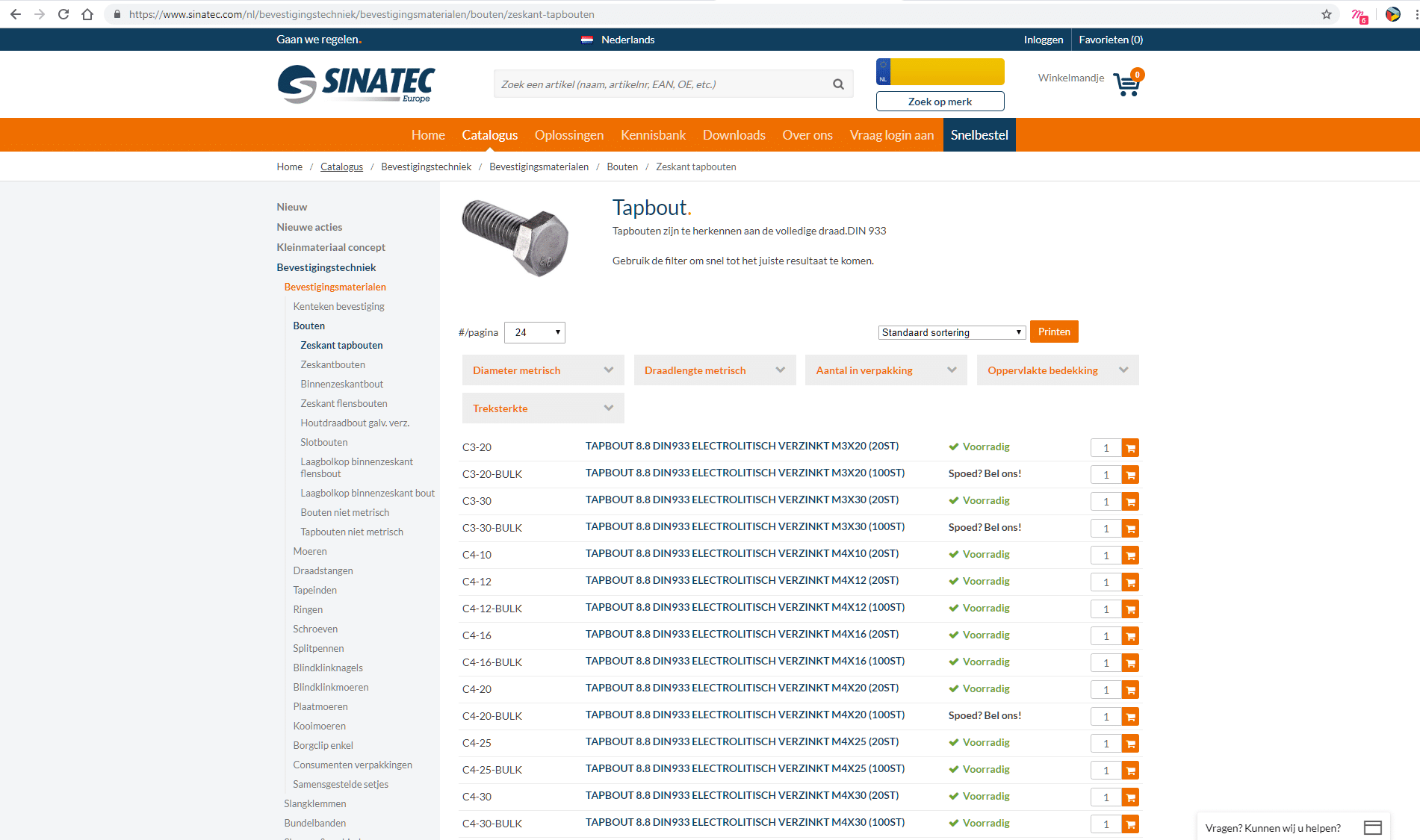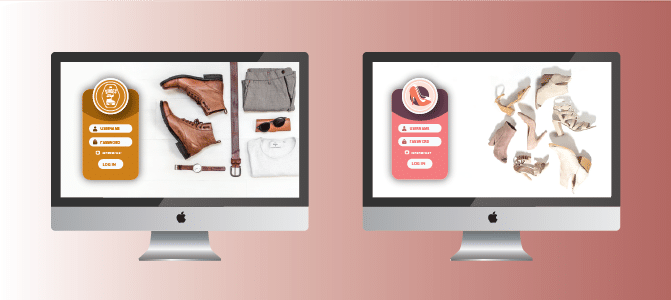Online shopping for a car part or a coffee machine is becoming increasingly common. But creating a good, clearly structured shop for this is not easy. You often need expertise, knowledge of SEO, market knowledge and above all persistence. So, what requirements does a good B2B e-commerce webshop have to satisfy?
B2B businesses often make the move towards e-commerce because the customer wants to have the same purchasing experience and the same convenience that they experience with B2C. In addition, B2B customers start their search online. If you can order a book online, why shouldn’t you be able to order semi-manufactured products online as well? Isn’t it true that anyone can start a webshop?
B2C webshops logically target a large target group, and volume is important for this. It is different for B2B businesses; a smaller group buys more frequently and with higher average order values.
Because this dynamic is essentially different, a B2B e-commerce webshop also places a greater emphasis on ease of ordering. Being able to order the right products easily is a pure gain for their customers. Supporting the customer in making their purchase is very important here. In particular, because the differences in product specifications are often very small and the consequences of an ordering error can be major. Moreover, being able to carry out an order smoothly and routinely is a requirement for B2B businesses.
A good example of small differences in product specifications. (with thanks to Sinatec)
So, a B2B digital commerce environment requires greater functionality and flexibility if it is to satisfy the wishes of the various customers. Customers want the prices they have agreed to be automatically processed in the shop, that authorizations are in place for who can order what products, and up to what limit. How does delivery take place if multiple people can place orders? Besides this, it is handy if the product range offered can be tailored for each customer.
Unlike in the case of B2C, prices are often negotiated and laid down contractually in advance. The webshop needs to mirror and facilitate these agreements faultlessly. Another aspect to consider may be international differences, for instance, in taxes, rules, and guidelines.
This paragraph is not intended to scare you away. In fact, with the right choice of platform, a clear focus, and the following 10 tips, you will be even more successful with a B2B e-commerce webshop than you already are.
1. Talk to your existing customers
Learn from your loyal customers. What do they think is important in a B2B e-commerce webshop? Who normally places orders? Pay your customers a visit and find out what makes their business tick.
If you are active in a particular niche, there is a good chance that there will be many similarities between your customers. Make sure that you understand how your B2B commerce environment can offer added value to these customers.
Involve these customers in the development of your online shop as well. This way you will quickly identify impractical flows, in the meantime generating your biggest fans and ambassadors.
Of course, you need to expressly involve your account managers as well. Talking to their customers, they will quickly find out what could be made easier in the user experience of your digital ordering environment.
2. Personalization
A B2B customer generally buys in a different manner from a B2C customer, but B2B buyers are also a diverse group. So, it is important that your various customers are offered a personalized experience. For instance, maybe with personalized offers and promotions, but also tailored content.
Conversion optimization is less important in a B2B e-commerce environment than in a B2C environment. It is more logical to make it easy for your customer to quickly find the right product/type combination with extensive filters, clear categories, buyer guides, instruction videos etc.
When choosing a platform, pay attention to segmentation and personalization possibilities.
At Propeller we distinguish 4 levels of personalization:
- Each customer has their own b2b e-commerce portal with their own product selection, prices and authorization
- Product pages and category pages are aligned to the characteristics of the user; for example, to his/her function or sector.
- The experience on the webshop is attuned to circumstances such as the weather, location, etc.
- The (known) user is addressed personally, using the data fields in the CRM.
3. Customer-specific and dynamic prices and catalog
As a B2B e-commerce player, in many cases, you deal with multiple suppliers, partnerships, and quite possibly international traffic. You will need to process all of this on your e-commerce platform. Your catalog may be available to all customers, to a customer segment, or maybe only visible to one specific major customer. Your system will need to make it easy for you to create these segments in a flexible manner.
If you are purchasing from suppliers with flexible prices (for example, day prices), then your business-to-business platform will need to process these prices automatically (together with the sales margin and discounts) per segment or per customer. In that case, what you are talking about is in fact a b2b e-commerce portal.
4. ERP-integration
The ERP system is where such matters as E-procurement (orders, invoices, delivery notes, delivery reports), product data management, and point-of-sale systems are stored.
If you have a real-time link to this, you ensure that your customers always have up-to-date and accurate information. Orders can be implemented automatically and your invoicing can be automated.
Your ERP system is a vast source of information. based on this information you can get to know your customers better, which products are doing well, what the average order value is per customer or segment, and much more.
5. Customer Self-service
B2B customers are different from B2C customers; we had already established this. Your B2B customers want an efficient experience and accurate information that is always up-to-date. They want to be able to access this information whenever and wherever they want. If you link to CRM, ERP, PIM, and distributors, you can offer this to your customers.
You offer your customers an environment in which they can view their order history, can view payment statuses, have access to outstanding orders, etc.
When selecting a platform for your B2B e-commerce, pay attention to these integrations. Which are present as standard, and what does it mean if integration has to be developed?
Of course, it is even better if all these functions form an integral part of your e-commerce platform (as in the case of Propeller).
6. Real-time inventory management
With a B2B webshop, you actually create an extra sales channel, and that also means that inventory management has to be incorporated in this. Your customer expects up-to-date availability in an online environment, and if that isn’t accurate it causes unnecessary irritation.
If you make agreements relating to drop-shipment with your suppliers, you will have to align these to products from other suppliers and/or your own inventory. However you organize this, make agreements about this with your customers.
7. Scalability
A B2B e-commerce platform is by definition more scalable than your inside sales division. But what should you do if you grow too quickly, want to add new product groups, start selling internationally, and/or have exceptional peak moments?
It is extremely important right from the start to choose a platform that can move with you without additional expenditure. A SaaS platform (software as a service) removes all your concerns relating to the management of your platform. This means that you can concentrate on providing optimal service to your customers, improving your conversion rate, and finding new customers.
8. B2B customers also have a mobile
Mobile phones play a smaller role in business transactional traffic than in the case of consumers. Nevertheless, a good mobile interface is important for a B2B webshop.
Customers still want to be able to look at your catalog via their mobile phones (for example, if they are looking for a solution when they are visiting their customers), to check on the status of an order, and to place an order when they are out on location.
Take a regular look at the behavior of your mobile users; which functions are used frequently, and which are used less frequently. Align your mobile environment to this. It could be that a webshop app ties in better with what your customer wants? A good mobile version is also important for your SEO (search engine optimization). Google rates you increasingly on the basis of a user-friendly and fast mobile site.
9. Tools for your own sales personnel
In a robust digital commerce platform, inside sales personnel and account managers are able to directly draw up quotations, place an order on behalf of a customer, and assist the customer with configuring a (large) order.
By bringing these functionalities together in one environment, you ensure that your customer and the account manager always see the same quotation (because it is available under his/her specific account), that fewer mistakes are made, and that the number of actions involved in the ordering and delivery processes is greatly reduced.
In a B2B environment, sales personnel will continue to be important. However, their role changes. They will be able to grow more, from order intake towards relation management, and the discussions they hold will be more strategic in nature.
10. Customer-specific ‘Portals’
We have already referred to this a few times in this article; personalization and segmentation. You can take this a bit further by offering your customers their own environment. An environment that has a look-and-feel that is specially designed for that customer. The product selection within these b2b e-commerce portals is completely aligned to the specific customer, the agreed prices are incorporated, the authorizations are built-in, and agreed delivery terms integrated.
Imagine what this means for your customer loyalty!
Make sure that you choose a B2B platform that can offer customer-specific portals, that you as a webshop process all your orders and do your marketing in one environment, and that you can add new portals.
In other words; put yourself in your customer’s position and make sure that you can grow along with their wishes in the future. Service and user convenience will always have the edge on simply competing on price. Make the service that your company provides unique with a perfect customer experience in a B2B webshop that speaks your customers’ language!







